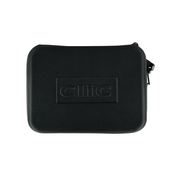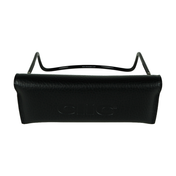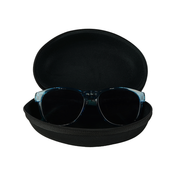In an increasingly digital world, our eyes are constantly exposed to the glare of screens just about anywhere. If we're being honest, most of us have spent ample time on our smartphones while laying in bed, at the dinner table, and quite possibly in the bathroom. It's not something anyone is proud of - but it's our new reality.

And the high-energy visible blue light that is emitted has raised concerns about its impact on our eye health and overall well-being. As we navigate this technology-driven era, the significance of blue blocking glasses becomes ever more evident. Let's explore why these glasses have transformed from a niche accessory to a vital tool for safeguarding our eyes and maintaining our quality of life.
-
Understanding Blue Light's Impact: In comparison to other light waves,
Blue light has higher energy waves than other colors and our eyes cannot effectively filter blue light, so more can pass through the eye to the retina. This type of high energy light has proven to disrupt our sleep patterns, leads to digital eye strain, and raises concerns about long-term eye health issues. A recent study by the American Academy of Ophthalmology revealed that Americans spend, on average, more than 7 hours per day using digital screens, significantly increasing blue light exposure and its potential risks.

- The Role of Blue Blocking Glasses: Blue blocking glasses, equipped with advanced coatings, act as a shield against the potential harm caused by excessive blue light exposure. These glasses work by filtering out a substantial portion of blue light, particularly the short-wavelength blue light that's most disruptive to our sleep-wake cycle. A survey conducted by the Vision Council found that over 70% of adults experience digital eye strain, highlighting the need for solutions like blue blocking glasses to mitigate discomfort and potential health risks.
So what are the common benefits you can expect after you start wearing your CliC Blue Light Blocker + Readers?
Reduced Digital Eye Strain: The Vision Council's survey calculated that more than 60% of adults reported experiencing symptoms of digital eye strain, including dry eyes, irritation, and blurred vision. Blue blocking glasses alleviate these discomforts by reducing blue light exposure, enhancing visual comfort, and decreasing the prevalence of eye strain.
Improved Sleep Quality: Research published in the journal Sleep Health suggests that excessive blue light exposure, particularly before bedtime, suppresses melatonin production, disrupting sleep patterns. The study found that individuals using blue blocking glasses experienced improved sleep quality and increased melatonin levels.
Preservation of Eye Health: The American Macular Degeneration Foundation highlights that prolonged blue light exposure can contribute to age-related macular degeneration (AMD) and retinal damage. By reducing blue light exposure, blue blocking glasses offer a protective measure against potential eye health issues.
Enhanced Visual Comfort: The Vision Council reports that more than 80% of American adults use digital devices for more than two hours a day, leading to visual discomfort. Blue blocking glasses alleviate glare and reduce the intensity of blue light, enhancing visual comfort, particularly during prolonged screen use.
With the mounting evidence of the potential risks posed by excessive blue light exposure, it's time to take action and grab a pair of CliC Blue Light Blocking glasses. The numbers don't lie; they're practically shouting about the growing concern for our eye health and sleep patterns. These glasses aren't just a trendy accessory; they're your smart investment in visual well-being. By slipping on CliC Blue Light Blockers, you're not just saying no to digital eye strain, you're also giving a wink to better sleep quality and your peepers a cozy, comfy blanket. So, while we're enthusiastically embracing technology, let's make sure our eyesight remains as sharp as our witty blog posts – clear and comfortable for years to come!
Educational Resources: The Vision Council, Global Web Index, American Academy of Opthmology, The American Macular Degeneration Foundation, Sleep Health Journal





